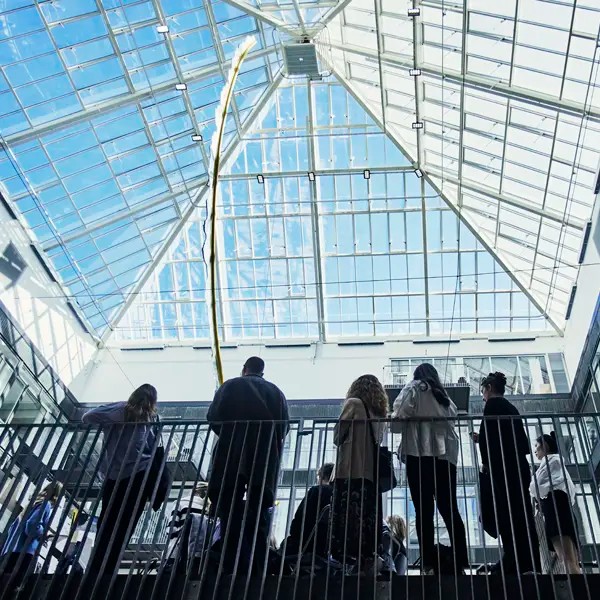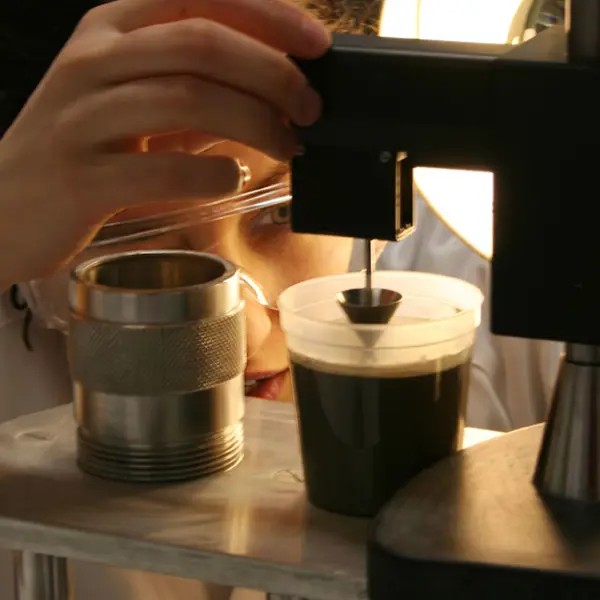Our alumni from graduate and postgraduate education contribute in shaping the built society of the future. Meet some of our graduated doctors and find out more about their specific research focus and how they experienced their time at Chalmers!

Andreas Alhede, Structural Engineering
Doctoral Degree in the autumn of 2025
"It has truly been an amazing journey, full of challenges and rewards. There have been ups and downs, but those moments are part of what has shaped both my research and myself. I’ve developed a lot, not only in terms of technical and academic skills but also on a personal level - learning how to navigate complex problems, collaborate with others, and persist when things get tough."
About Andreas's research
Andreas Alhede's research has focused on steel corrosion in reinforced concrete, which is one of the most critical durability problems in concrete infrastructure. To investigate this, Andreas used advanced imaging techniques, X-ray and neutron computed tomography, to study internal processes at the material scale without destroying the specimens. By combining these two techniques, Andreas managed to obtain high-resolution data of both corrosion characteristics and the resulting concrete damage.
Among the most interesting findings, Andreas rate the ways he have integrated image-based data into advanced finite element analyses. This allowed him to bridge experimental kinematics with numerical mechanics, and in doing so, he could study the mechanical response of the corrosion layer. One key outcome was identifying a non-linear stress and strain response in this layer, which helps explain the pressure build-up at the interface. Another important result was the identification of interfacial voids as critical hot-spots for localised corrosion, with the likelihood of corrosion initiation increasing with the size of these voids.

Sofie Hagejärd, Architectural Theory and Methods
Doctoral Degree in spring 2025
"During my time as a PhD student, I have had the privilege of being part of several exciting research projects that have created an inspiring environment with collaborations both within and outside academia. I have been able to develop in many different ways that I will benefit from in the future. Being surrounded by so many dedicated and friendly colleagues has really made this time a positive and memorable experience."
About Sofie's research
Sofie´s research has focused on the household perspective in relation to products and services that aim to reduce the environmental impact of consumption in and for the home. This has been explored in two focus areas. The first aims to explore opportunities for more sustainable kitchens based on circular economy principles. The second aims to understand the potential for households to become more flexible in their energy use to support a more sustainable energy system.
One of Sofie's conclusions from her research is that people have different capacities to change everyday practices, influence their living environment and invest in solutions to reduce environmental impact. Therefore, there is a need for different solutions to achieve a broad transition towards more sustainable consumption practices. Regarding the transition towards more “circular” kitchens, design strategies that implement different levels of flexibility and sustainability need to be combined with different circular business models, targeting different types of households. Regarding the transition towards more sustainable energy use, different levels of knowledge and preferences regarding manual control and automation need to be taken into account.

Sanjay Somanath, Building Technology
Doctoral Degree in Autumn 2024
"I have enjoyed my time at Chalmers. Being a PhD student here has allowed me to learn much from those around me and participate in many exciting projects. At my division, I am fortunate to be surrounded by colleagues who have made my time here truly memorable"
About Sanjay's research
Sanjay´s research was focused on developing an analysis method that brings in the residents’ perspectives on neighbourhood planning, particularly regarding accessibility. Accessibility studies in neighbourhood planning traditionally focus on destinations – the places people want to reach. In my research, however, I tried to look at the residents’ perspectives to understand who might be left out in the planning process.
One of his most interesting findings is how this resident-focused approach aligns closely with planners’ concepts of social sustainability. The planners he interviewed prioritised the residents in their definition of social sustainability and placed them right at the centre, and his analysis method works similarly: it creates an artificial neighbourhood that has a composition similar to that of a real neighbourhood in Gothenburg. It then simulates all the different activities the residents would engage in throughout the day, assessing how well they can accomplish those activities. Placing the resident’s daily needs at the centre of the planning process and offering a way to make neighbourhoods more inclusive and equitable.

Marie Abadikhah, Water Environment Technology
Doctoral Degree in Spring 2024
"My time as a PhD student has been a journey filled with both highs and lows. One of the main lessons I've learned is how to adapt to unexpected challenges, such as experiments not yielding the expected results, and to view these challenges as opportunities rather than setbacks. Additionally, meeting people with diverse experiences and perspectives has enriched my personal and professional growth immensely."
About Marie's research
Marie's research focus was on the microbial communities in bioelectrochemical systems and the various factors that affect their development and performance, such as system design, material, and interactions with other organisms. One of her most interesting research findings was the identification of viruses and their specific associations with function-specific bacteria within the system. At the time – and to the best of the researchers knowledge – the first time viruses and their associations had been observed in bioelectrochemical systems!

Paul Drenning, Geology and Geotechnics
Doctoral Degree in Spring 2024
"It's been great! Of course, it is challenging to do a PhD, but it is also stimulating to be able to dive deep into so many exciting things. My work is interdisciplinary, so I've explored a lot of exciting topics (although I've actually learned how much I don't know). I have also been able to work more independently with good support from my supervisors and have presented a lot in different contexts. I have tried to work closely with the industry all the time, so I have learned how important it is to be able to communicate your research results so that it is both accessible and useful for the industry, and I really hope that what I have done will promote the use of GRO"
About Paul's research
Paul's research is about exploring different uses of gentle remediation options (GRO) to both manage risks and improve soil health (i.e., delivering ecosystem services) at contaminated sites. Their use today is quite limited, and Paul developed applied knowledge and methods to show the possibilities/challenges and pros/cons of these techniques that aim to widen the opportunity windows and demonstrate the added value for successful use of GRO in practice.


